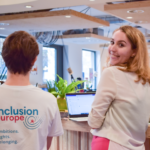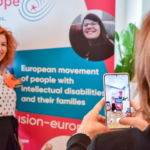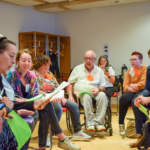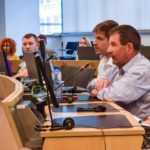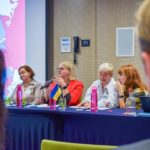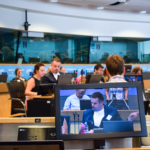Europe in Action took place in Brussels from the 7 to 9 September 2022. The conference gathered over 120 attendees from 27 different countries. It was an opportunity for the inclusion movement to come together after almost 3 years. An opportunity to meet, exchange information and learn from one another about how to promote inclusion successfully. To discuss and plan next steps in our fight for full rights and inclusion of people with intellectual disabilities and families.
Day 1, 7 September
Jyrki Pinomaa, the president of Inclusion Europe, spoke about his experience fighting to end segregation with his two sons with disabilities. Jyrki also presented the past activities and strategy of Inclusion Europe.
Elisabeta Moldovan, a self-advocate from Ceva de spus / Unloc in Romania, spoke about the bad treatment she suffered while living in the institutions and explained how she managed to flee. With her experience, she is now helping other people to get free from institutions and learn to live independently.
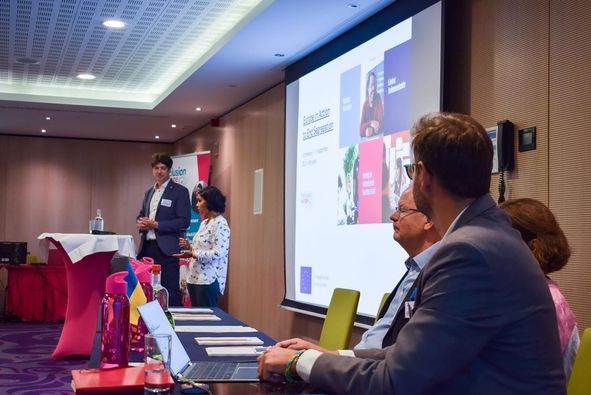
Elisabeta Moldovan speaking at the conference.
Cinzia Agoni, president of GAMP, an organisation created to fight the lack of places for people with complex support needs in Belgium. Cinzia shared the perspective of people with complex support needs and their fight for independent living. “If we manage to achieve inclusion for people with very complex needs, there will be inclusion for everyone” – Cinzia Agoni, director of GAMP, Brussels. Her final words: fight fight fight. Inclusion starts at birth, continues throughout life and involves the whole society.
Katarina Ivanković Knežević, director for Social Rights and Inclusion at the directorate general for employment, social affairs and inclusion of the European Commission, spoke about the adoption of the European Care Strategy, and the following steps to negotiate the text of the recommendation with Member States. Katarina also referred to the situation of people with disabilities in Ukraine and fleeing Ukraine. With such an unpredictable situation, developing appropriate policies is a challenge, but the European Union has been providing support through humanitarian services or different stakeholders in the neighbouring Member States.
We also had the honour to welcome Olena Kravchenko, chairman of the VGO Coalition, and Raisa Kravchenko, president of the VGO coalition. Olena spoke about the situation of people with disabilities in Mariupol, a city completely destroyed by Russian aggression, and elsewhere in Ukraine. Raisa also mentioned that the situation was bad before, mothers taking care responsibilities were exhausted, the pandemic made things worse and now the war. Olena and Raisa presented a video from the Coalition to thank the members of Inclusion Europe and show what they were able to do with the donations: Відеопривітання для Inclusion Europe. Tetiana Lomakina, adviser of the President on barrier-free society in Ukraine joined us online to express her wish to rebuilt Ukraine in an inclusive manner. Her presentation here: Привітання для учасників конференції “Європа в дії“
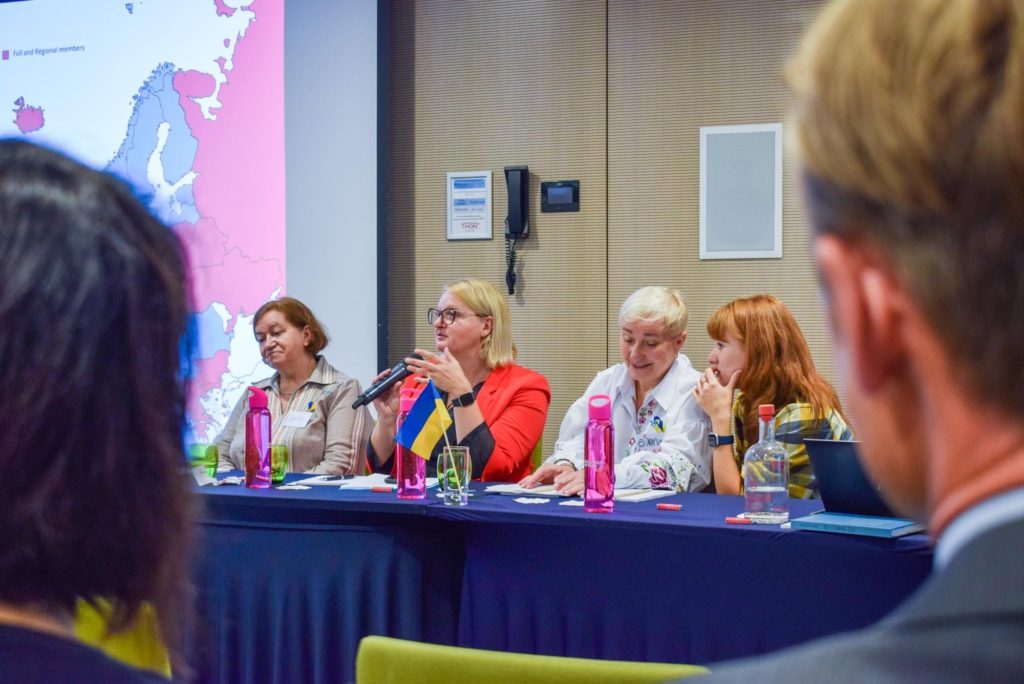
Raisa Kravchenko, Katarina Ivanković Knežeivić, Olena Kravchenko.
Deinstitutionalisation in Czechia session was opened by the Czech deputy Minister of Labour and Social Affairs, Zdislava Odstrčilová, who provided an overview on Czechia’s process towards deinstitutionalisation. Radek Rosenberger, head of social services of CSS Stod, spoke about the changes in services provided by this organisation. Milena Johnová, councillor for health and social affairs from the City of Prague, gave a presentation about the city where there are still many missing services, such as respite care, support for people with complex support needs. Milena spoke about recent closure of an institution run by Prague. Self-advocate Luláš Kudlička talked about his experience growing up in an orphanage, moving out of institutions, and establishing his own life. Representative of the European Commission (DG Regio, DG Empl) spoke about support to deinstitutionalisation from EU funds, especially the regional development funds, and ESF+. Jan Pfeiffer, who leads mental health reform at ministry of health care, talked about what changes are part of the psychiatric care reform. Lázsló Bercse, vice-president of Inclusion Europe and chair of EPSA, talked about his views on the process of deinstitutionalisation in Czechia.
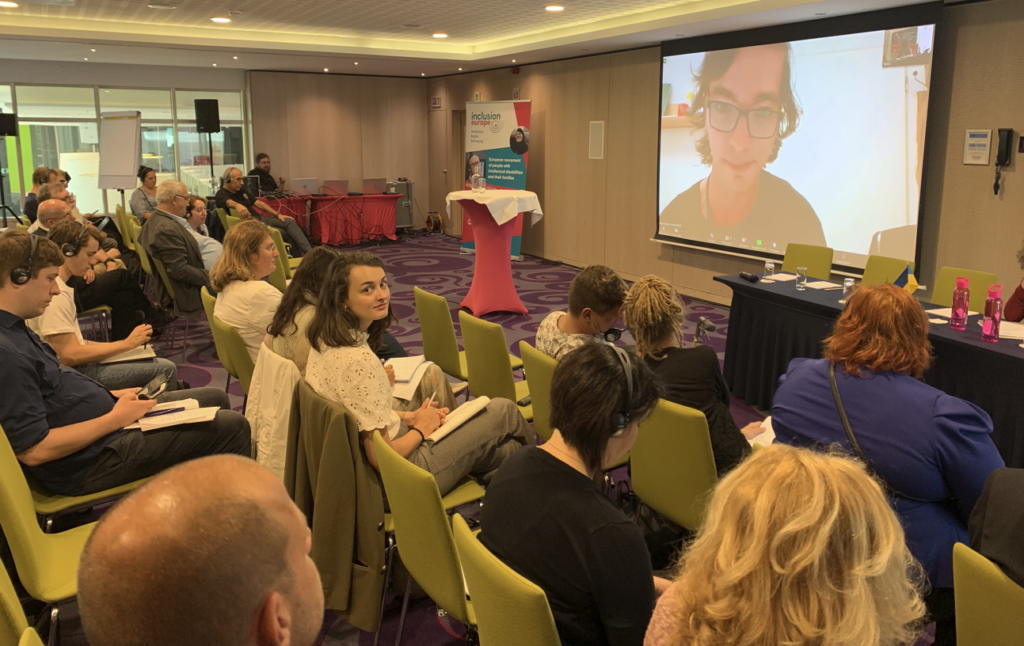
Lukáš Kudlička speaking (on screen) at a conference
Jobs for people with intellectual disabilities session was organised in partnership with the European Economic and Social Committee. Soufiane El Amrani, Inclusion Europe’s easy-to-read officer and self-advocacy expert, hosted a conversation on the importance of having a job for people with intellectual disabilities, as a vector for inclusion and ending segregation through financial independence. We had the honour of hearing the president of EESC’s thematic group on disability, Pietro Vittorio Barbieri who announced that this group is now a permanent group, ensuring a continuity in the work of the EESC towards better respect of the rights of people with disabilities in the EU. Another honourable speaker was Katrin Langensiepen, a member of the European Parliament from Germany. She shared some interesting information about the work she has been doing in Germany and but also her personal story. Finally, Ana Martinez, a self-advocate from Plena Inclusion in Spain, spoke about the work of Plena Inclusion and her own experience.
The last session of the day was about practising personal future planning to realise big dreams workshop with José Smits from Inclusie Netherlands to give advice to parents and self-advocates on how to plan when having a child with disabilities.
Day 2, 8 September
The morning of the second day was divided in focus group discussions, where the purpose was to collect more information from our members to shape the advocacy work of our movement.
Legal Capacity session lead by Camille Latimier, director of Inclusion Czechia, about systemic steps to restore the right to decide for people with intellectual disabilities.
Deinstitutionalisation session about key questions on the topic, and what Inclusion Europe members think and do about it.
Self-advocacy session lead by László Bercse, about European Platform of Self-Advocates activities and how EPSA can make sure to hear the voices of people with high needs of support. Ana Martínez presented the national platform of self-advocates in Spain. EPSA Steering Group also asked self-advocates about what they need to live in the community, outside institutions.
Family support session was hosted by Kimber Bialik from Inclusion International and Helen Portal from Inclusion Europe on how social protection policies support families of people with intellectual disabilities.
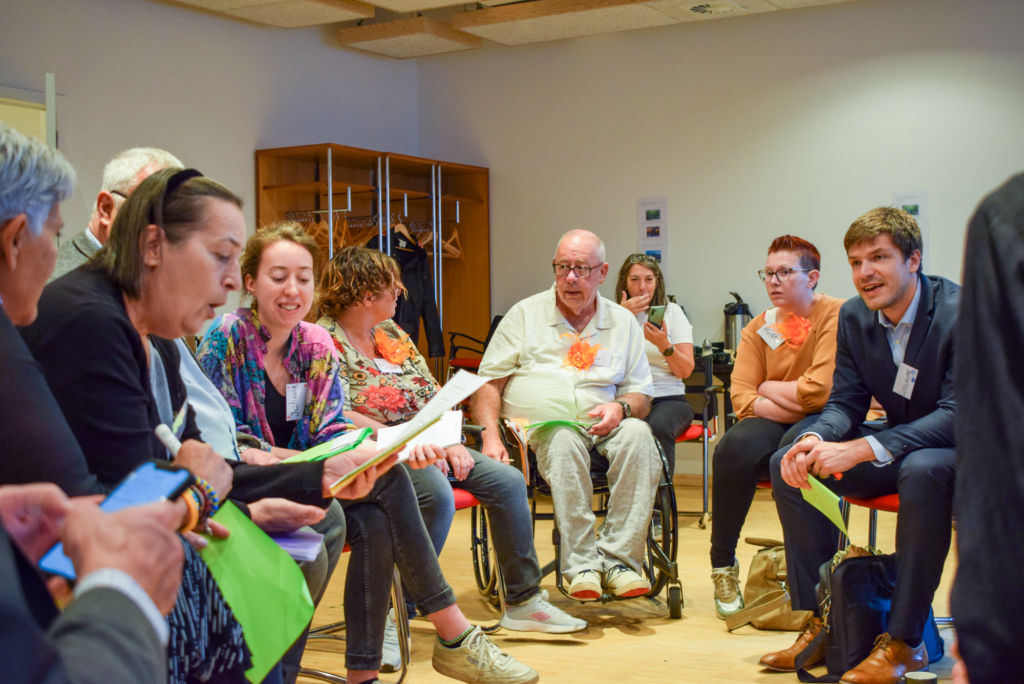
Workshop during Europe in Action
Afternoon session on Disability-inclusive rebuilding in Ukraine moderated by Catherine Naughton, director of the European Disability Forum focused on immediate and rebuilding needs in the country. Tetiana Lomakina, adviser of the President on barrier-free society in Ukraine, spoke about the needs and priorities from the view of Ukrainian authorities. Raisa Kravchenko from the VGO Coalition spoke about the consequences of the war on people with intellectual disabilities. Mariya Yasenovska, EDF, talked about accessibility and disability-inclusive rebuilding and humanitarian response. Freek Spinnewijn, director of FEANTSA, the organisation of homeless people, spoke about preventing homelessness, and the links between homelessness and people with intellectual disabilities.
Finally at the members exchange session, participants shared what they were good at in their organization and what they would like support on.
Day 3, 9 September
Heather Gilchrist and Jamie Rutherford of ENABLE Scotland spoke about their work with ENABLE Scotland. Heather is the membership ambassador and self-advocate from ENABLE Scotland. She spoke about ENABLE’s history of self-advocacy and their campaign to end institutional living in Scotland. ENABLE campaigned and in 2018, the Scottish Government identified at least 700 people in inappropriate institutions a long way from home. Jamie talked about ENABLE Scotland’s “personal assistance model” of providing support to people with intellectual disabilities.
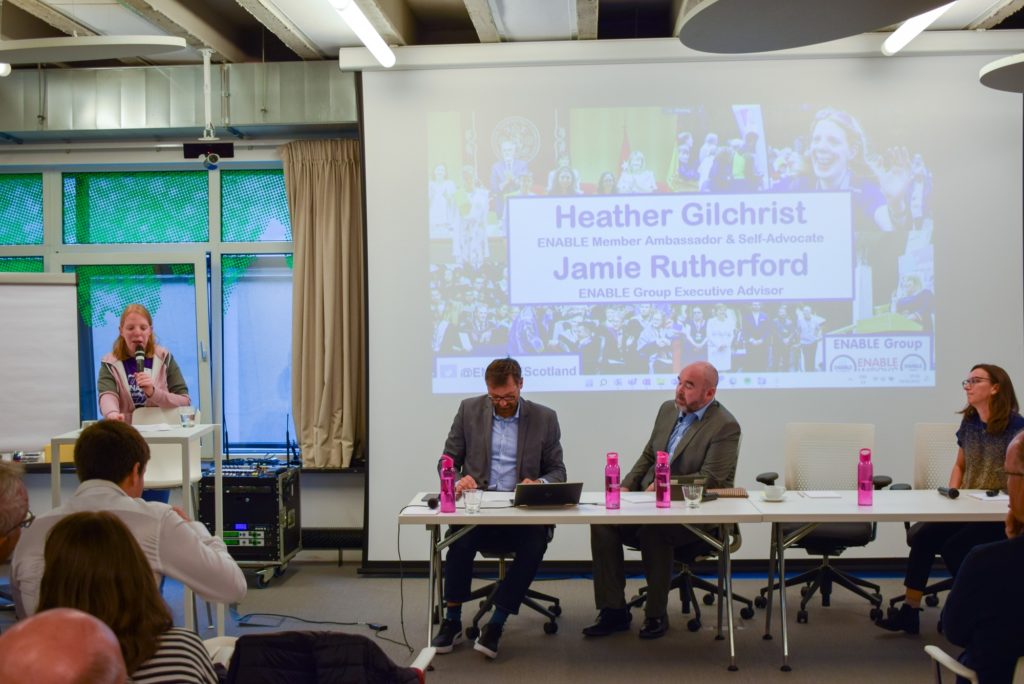
Heather Gilchrist speaking at Europe in Action
Sylvia Costantini, managing director at Revolutionise, spoke about fundraising and how great fundraising isn’t about the size of your organisation, its history, or even your cause. Organisations that achieve significant and sustainable income growth have very specific things in common. Three key aspects when raising funds: transformation growth, sustainable growth and mission driven growth
Paul Alford, a self-advocate from Inclusion Ireland, spoke about his experience leaving institution, becoming independent by having a job on the open labour market, knowing how to manage his money, buying a house and hiring a supporter.
Announcements
Following the discussions during the conference, Inclusion Europe is establishing internal task group to support provision of advocacy-led, community-based services.
Future events:
- Hear our Voices 2023, Tallinn, Estonia
- Europe in Action 2024, Edinburgh, Scotland (UK)
More information
Europe in Action 2022 Archives – Inclusion Europe (inclusion-europe.eu)


